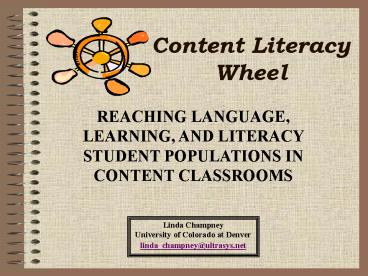Content Literacy - PowerPoint PPT Presentation
1 / 19
Title:
Content Literacy
Description:
... the 12th graders could elaborate or extend the ideas they ... ELABORATION. CONTENT LITERACY: READING, WRITING, SPEAKING, LISTENING, VIEWING TO LEARN CONTENT ... – PowerPoint PPT presentation
Number of Views:80
Avg rating:3.0/5.0
Title: Content Literacy
1
Content Literacy Wheel
REACHING LANGUAGE, LEARNING, AND LITERACY STUDENT
POPULATIONS IN CONTENT CLASSROOMS
Linda Champney University of Colorado at Denver
linda_champney_at_ultrasys.net
2
Effectively meeting the needs of the special
populations of students in content classrooms
while also educating the general education
students is a challenge.
PROBLEM
- Students with Learning Disabilities. The
national statistics from the U.S. Department of
Education from 2002-2003 report that 6,449,904 or
13.4 (National Center for Education Statistics,
2004) of public school children are served under
the Individuals With Disabilities Act. - Students with Limited English Proficiency. 42
of all public school teachers in 2002 have at
least one limited English proficient student in
their classes and only 30 of those teachers have
received any training in how to teach those
students (U.S. Department of Education, National
Center for Education Statistics, 2003). - Struggling Readers. The National Assessment of
Educational Progress cites 69 of 4th graders,
69 of 8th graders and 66 of 12th graders were
below the proficient level in reading in 2002.
Only 5 of the 12th graders could elaborate or
extend the ideas they were reading about (U.S.
Department of Education, National Center for
Education Statistics, 2002).
3
SYSTEMIC CHANGE FRAMEWORK
Focus of Content Literacy Wheel Research
Ferguson, D. L., Kozleski, E. B., Smith, A.
(2003). Transformed, Inclusive Schools A
Framework to Guide Fundamental Change in
Urban Schools. Effective Education for
Learners with Exceptionalities, 15,
Elsevieer Science, pp. 43-74.
4
DEVELOPING A GROUNDED THEORY
Grounded theory is a qualitative research
methodology in which substantive theory is
derived through an ongoing process of continually
reviewing the data, refining questions, and
re-evaluating these changes. The resulting
substantive theory is a theory that is applicable
to a specific situation.
Jacelon, C. S., O'Dell, K. K. (2005, February).
Case and grounded
theory as qualitative research methods. Urologic
Nursing, 25(1), p. 50.
5
Recommendations for General Education Students in
Content Classrooms
- The Learner-Centered Principles Work Group of the
American Psychological - Association Board of Educational Affairs (1997)
generated the following list of - principles of effective instruction for all
students - Learning needs to be an intentional process of
constructing meaning - Goals must be personally relevant to the student
- Learner must be able to connect new knowledge to
prior knowledge in meaningful ways - Learner exercises control over his/her thinking
by creating and using strategies where
appropriate - Learner uses metacognitive strategies
- Instructional practices and the classroom
environment must be appropriate for the learners - Motivation to learn is influenced by the
students background and prior experiences with
learning and must be taken into consideration - Intrinsic motivation to learn is enhanced when
students are interested in the subject under
discussion, are given a degree of personal choice
and control, and are able to see the relevance of
what they are learning to real life - Unless students are motivated, they will not
learn. They need a purpose for learning - Individuals learn best when material is
appropriate to their developmental level and is
presented in an enjoyable and interesting way - Learning can be enhanced when the learner has an
opportunity to interact and to collaborate with
others on instructional tasks - Educators need to help students examine their
learning preferences and expand or modify them,
if necessary - When learners perceive that their individual
differences in abilities, backgrounds, cultures,
and experiences are valued, respected, and
accommodated in learning tasks and contexts,
levels of motivation and achievement are enhanced
- Assessment provides important information to both
the learner and teacher at all stages of the
learning process
6
(No Transcript)
7
VALIDATING A GROUNDED THEORY
The result of the grounded theory process of
data collection and analysis is a theory, a
substantive-level theory, written by the
researchers close to a specific problem or
population of people. This theory is subjected
to further empirical testing because now we know
the variables or categories from field-based
data.
Cresswell, J. W. (1998). Qualitative inquiry and
research design Choosing among
five traditions. Thousand Oaks Sage, p. 57-58.
8
(No Transcript)
9
(No Transcript)
10
CONTENT LITERACY READING, WRITING, SPEAKING,
LISTENING, VIEWING TO LEARN CONTENT
11
(No Transcript)
12
(No Transcript)
13
VOCABULARY
CONNECTING COGNATES CLARIFYING NOTING WORD
STRUCTURE CREATING MNEMONICS (Using Pictures
Story Cues) USING CONTEXT CLUES RECOGNIZING
EMBEDDED MEANINGS
VOCABULARY
METACOGNITION
CONTENT LITERACY
ENGAGEMENT
CONTENT LITERACY WHEEL
CONTENT LITERACY READING, WRITING, SPEAKING,
LISTENING, VIEWING TO LEARN CONTENT
14
ORGANIZERS
CONNECTING COGNATES CLARIFYING NOTING WORD
STRUCTURE CREATING MNEMONICS (Using Pictures
Story Cues) USING CONTEXT CLUES RECOGNIZING
EMBEDDED MEANINGS
CONTENT LITERACY READING, WRITING, SPEAKING,
LISTENING, VIEWING TO LEARN CONTENT
15
ELABORATION
SUMMARIZING USING ELABORATIVE INTERROGATION DRAM
ATIZING VISUALIZING DEMONSTRATING LEARNING
COOPERATIVELY IMPLEMENTING RECIPROCAL TEACHING
ETC.
CONTENT LITERACY READING, WRITING, SPEAKING,
LISTENING, VIEWING TO LEARN CONTENT
16
ENGAGEMENT
LEARNING BY INQUIRY GIVING PRAISE
RECOGNITION GIVING STUDENT CHOICES ACCESSING
BACKGROUND EXPERIENCES CONSIDERING STUDENT
INTERESTS PROVIDING LEVELED TEXTS USING
CONCEPT-ORIENTED READING INSTRUCTION (CORI)
VOCABULARY
CONTENT LITERACY
ORGANIZERS
ENGAGEMENT
CONTENT LITERACY WHEEL
CONTENT LITERACY READING, WRITING, SPEAKING,
LISTENING, VIEWING TO LEARN CONTENT
17
METACOGNITION
VOCABULARY
METACOGNITION
THINKING ALOUD SELF-MONITORING OF UNKNOWN WORDS
COMPREHENSION USING JOURNALS / LEARNING
LOGS REFLECTING / SHARING
CONTENT LITERACY
ORGANIZERS
CONTENT LITERACY WHEEL
CONTENT LITERACY READING, WRITING, SPEAKING,
LISTENING, VIEWING TO LEARN CONTENT
18
(No Transcript)
19
CONTENT LITERACY READING, WRITING, SPEAKING,
LISTENING, VIEWING TO LEARN CONTENT































